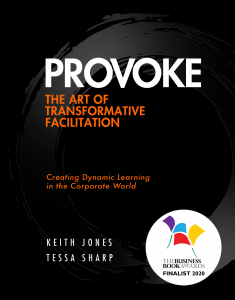
Download the first THREE chapters for free, and start learning how to catalyse transformation in your organisation.
Recently shortlisted for the UK Business Book Awards 2020, these chapters from PROVOKE: The Art Of Transformative Facilitation will:
- Introduce you to the established research in the psychology and neuroscience of how adult humans beings actually learn.
- Provide the context and business case for why transformative learning is so important for organisations and their people today.
- Highlight how knowledge and capability is acquired and some of the key questions for learning commissioners to consider
- Stimulate your thinking about the learning agenda and approach for your organisation

About PROVOKE:
In today’s ultra-competitive, corporate-centric world, how do you get a smart CEO to rethink how they operate? And how do you nurture a shy manager into realising their true boardroom potential? There are a myriad of ways to examine leadership, performance agility and learning, but which techniques really make a difference?
With forty years of experience as transformative facilitators, Alchemy Worldwide founders Keith Jones and Tessa Sharp are unrivalled in their ability to revolutionise corporate and personal thinking in order to maximise the potential for growth and advancements for businesses and, most importantly, the people who run them.
Shortlisted for the UK Business Book Awards 2020 – PROVOKE: The Art of Transformative Facilitation – expands current thinking about how to effectively develop tomorrow’s business leaders.
Robustly based upon the established principles of the psychology of learning and human transformation, it presents the TRANSFORM8© model of facilitation; this paves the way to the creation of dynamic learning at its purest and most powerful, a radical and comprehensive model of facilitation which identifies the eight key contexts within which transformative learning occurs.